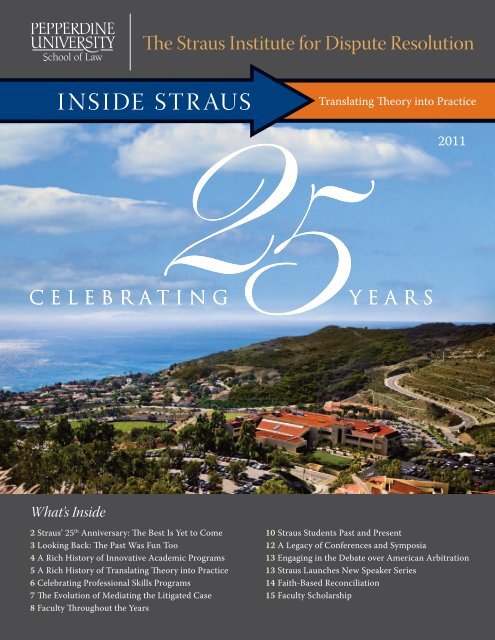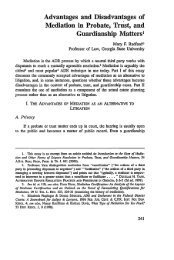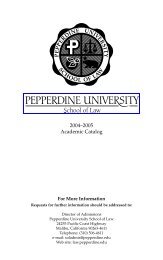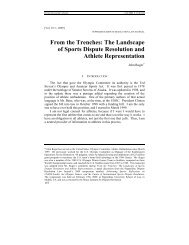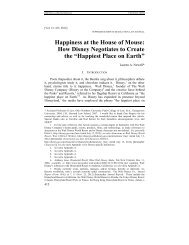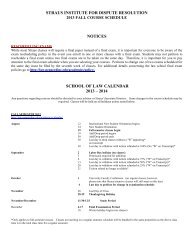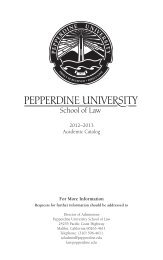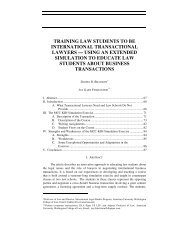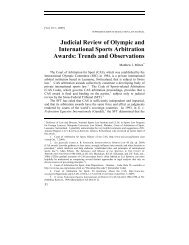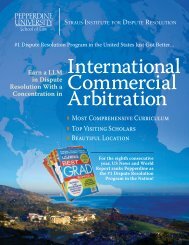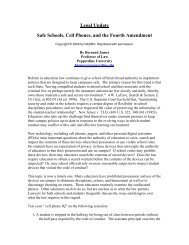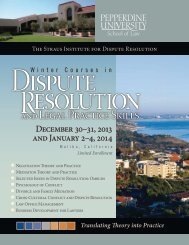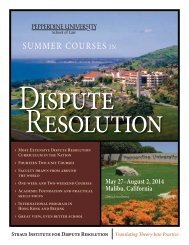INSIDE STRAUS - Pepperdine University School of Law
INSIDE STRAUS - Pepperdine University School of Law
INSIDE STRAUS - Pepperdine University School of Law
You also want an ePaper? Increase the reach of your titles
YUMPU automatically turns print PDFs into web optimized ePapers that Google loves.
The Straus Institute for Dispute Resolution<br />
I NS IDE STR AUS<br />
Translating Theory into Practice<br />
2011<br />
What’s Inside<br />
2 Straus’ 25 th Anniversary: The Best Is Yet to Come<br />
3 Looking Back: The Past Was Fun Too<br />
4 A Rich History <strong>of</strong> Innovative Academic Programs<br />
5 A Rich History <strong>of</strong> Translating Theory into Practice<br />
6 Celebrating Pr<strong>of</strong>essional Skills Programs<br />
7 The Evolution <strong>of</strong> Mediating the Litigated Case<br />
8 Faculty Throughout the Years<br />
10 Straus Students Past and Present<br />
12 A Legacy <strong>of</strong> Conferences and Symposia<br />
13 Engaging in the Debate over American Arbitration<br />
13 Straus Launches New Speaker Series<br />
14 Faith-Based Reconciliation<br />
15 Faculty Scholarship
Celebrating 25 years<br />
Straus’ 25 th Anniversary: the best is yet to come!<br />
By Tom Stipanowich<br />
Tom Stipanowich<br />
Recently, The Straus Institute<br />
hosted more than 125 teachers <strong>of</strong> dispute resolution<br />
courses from all over the United States and several<br />
foreign countries, most <strong>of</strong> whom were affiliated with<br />
various law school programs. When attendees were<br />
polled on the number <strong>of</strong> dispute resolution courses<br />
their law school sponsored, a large majority indicated<br />
that there were at least three such classes in their<br />
curriculum. Relatively few, however, could identify<br />
more than four or five.<br />
Yet a small group <strong>of</strong> people continued to hold up their<br />
hands for 10, 20, and even 30 courses in the curriculum. These<br />
individuals were overwhelmingly teachers affiliated with the<br />
Straus Institute, which annually provides about three dozen<br />
academic courses and numerous pr<strong>of</strong>essional skills programs<br />
around the United States and in foreign countries. The<br />
academic curriculum serves around 400 students each year,<br />
and the other programs many hundreds more. There is nothing<br />
quite like Straus!<br />
Peacemaker Award Announced<br />
When the Straus Institute began its life 25 years ago, it<br />
owed much to the sudden emergence <strong>of</strong> mediation as a tool<br />
for settling litigated cases, and to the growing market for<br />
mediation training among experienced lawyers who saw the<br />
possibility <strong>of</strong> “retooling” as a mediator. Today, while the interest<br />
in mediation continues unabated, the knowledge and skills<br />
imparted by Straus courses are at the heart <strong>of</strong> current U.S. and<br />
international law practice, and are also essential to positions<br />
(such as point-<strong>of</strong>-care ombuds) that did not even exist a<br />
decade ago. The institute’s focus has expanded dramatically in<br />
several ways. Today, Straus’ full- and part-time faculty bring<br />
together cutting-edge expertise in a wide variety <strong>of</strong> topics such<br />
as commercial and international arbitration, cross-cultural<br />
dispute resolution, psychology <strong>of</strong> conflict, and many other<br />
specialties (sports, environmental, entertainment, construction,<br />
medical/health, and domestic relations). A growing number <strong>of</strong><br />
LLM candidates, including Fulbright, Muskie, and Weinstein<br />
scholars, hail from countries around the world.<br />
Straus’ full-time faculty now includes a number <strong>of</strong> nationally<br />
and internationally known scholars who are engaged in a wide<br />
range <strong>of</strong> scholarship, policy making, and other important work.<br />
<strong>Pepperdine</strong> is fortunate to have developed a “critical mass”<br />
<strong>of</strong> faculty expertise. Those <strong>of</strong> us who teach and write here<br />
nearly always have one or more people with whom to vet new<br />
ideas and discuss current developments in the field. (The only<br />
problem is, we all are so busy that we most <strong>of</strong>ten see colleagues<br />
at distant events, not at home!)<br />
Today, the Straus Institute faces a world that is rapidly<br />
developing expertise in the management <strong>of</strong> conflict. There<br />
are myriad opportunities to train and to partner all over the<br />
globe. Meanwhile, dramatic developments in technology are<br />
changing the whole concept <strong>of</strong> communication as we know it<br />
and <strong>of</strong>fering new opportunities and challenges for the dispute<br />
resolution field worldwide. A quarter century from now,<br />
perhaps the Straus Institute will be a virtual education and<br />
training organization that truly spans and unites the globe!<br />
The PACIS Project in Faith-Based Diplomacy is the honored<br />
recipient <strong>of</strong> the national Association for Conflict Resolution’s<br />
prized PEACEMAKER AWARD to be bestowed at this<br />
year’s annual conference in October. The Peacemaker Award<br />
acknowledges the significant and sustained contributions by<br />
an individual or organization to the cause <strong>of</strong> peace. This award<br />
recognizes efforts to bring peace to ethnic, religious, and civil<br />
conflicts that have raged domestically and outside the United<br />
States. The Peacemaker Award was instituted in 2001.<br />
2
Looking Back: the past was fun too<br />
By Peter Robinson<br />
The year was 1986. The Challenger Shuttle<br />
disaster. The premier <strong>of</strong> the Oprah Winfrey Show. The<br />
U.K. and France announced plans to build the Channel<br />
Tunnel “Chunnel.” Ferdinand Marcos relinquished the<br />
presidency <strong>of</strong> the Philippines. In that same year Randy<br />
Lowry joined the <strong>Pepperdine</strong> <strong>School</strong> <strong>of</strong> <strong>Law</strong> faculty,<br />
serving as the director <strong>of</strong> clinical law and tasked with<br />
creating a program in dispute resolution.<br />
Randy Lowry<br />
a Harvard-educated lawyer, who then became<br />
CEO <strong>of</strong> Thrifty Drug Stores. He took great pride<br />
in solving problems collaboratively and never<br />
being personally sued.<br />
The dispute resolution institute at <strong>Pepperdine</strong><br />
bears the Straus name because Leonard and<br />
Dorothy believed in and supported the problemsolving<br />
lawyering skills the institute advances.<br />
Over the years, Straus has been recognized<br />
for serving the ADR field with distinction by the<br />
Ninth Circuit Court <strong>of</strong> Appeals, the International<br />
Academy <strong>of</strong> Mediators, the American College<br />
<strong>of</strong> Civil Trial Mediators, the California Dispute<br />
Resolution Council, and the Los Angeles County<br />
Bar Association. This year Straus’ PACIS Project<br />
in Faith-Based Diplomacy has been named as the<br />
recipient <strong>of</strong> the national Association for Conflict<br />
Resolution’s Peacemaker Award.<br />
Lowry resigned in 2005 to become the<br />
president <strong>of</strong> Lipscomb <strong>University</strong>. After a<br />
yearlong, nationwide search, Thomas Stipanowich resigned his<br />
position as the president <strong>of</strong> CPR to become codirector <strong>of</strong> Straus<br />
with long-time associate director, Peter Robinson. Stipanowich<br />
brought a nationally recognized reputation acknowledged by<br />
his receipt <strong>of</strong> the ABA Dispute Resolution Section’s prestigious<br />
D’Alemberte-Raven Award for distinguished service to the<br />
In 1986—25 years ago—Dean Ronald Phillips and the<br />
law school faculty determined that the then nascent field <strong>of</strong><br />
alternative dispute resolution was an especially appropriate<br />
emphasis for the <strong>School</strong> <strong>of</strong> <strong>Law</strong> because the reconciliation<br />
theme supported the school’s commitment to Christian values.<br />
Lowry’s vision, tireless energy, and extensive network <strong>of</strong><br />
ADR colleagues willing to support <strong>Pepperdine</strong>’s new program<br />
were soon apparent. Lowry developed a multi-pronged<br />
agenda consisting <strong>of</strong> five themes: academic courses and<br />
programs; CLE programs and conferences for practitioners;<br />
reconciliation programs especially targeting religious<br />
communities experiencing conflict; research and publication;<br />
and service. With only half <strong>of</strong> one pr<strong>of</strong>essor’s time and half <strong>of</strong><br />
one administrative assistant, it would be impossible to predict<br />
that each <strong>of</strong> those areas would mature and together create<br />
a nationally recognized program. It wasn’t long before the<br />
program was benefiting from intensive workshops and courses<br />
taught by nationally prominent scholars like Leonard Riskin,<br />
Bryan Johnston, Charles Wiggins, Jack McCrory, Charles<br />
Craver, Joseph Folger, Josh Stulberg, and Lela Love, as well as<br />
successful practitioners like George Nicolau, Jack Ethridge, Eric<br />
Lindauer, Jeffrey Krivis, Nina Meierding, and Terry Waite.<br />
Five years later, the institute was named for generous <strong>School</strong><br />
<strong>of</strong> <strong>Law</strong> benefactors, Leonard and Dorothy Straus. Leonard was<br />
Peter Robinson<br />
ADR field. Robinson brought continuity and momentum <strong>of</strong><br />
a successful program, having served as the Straus Institute’s<br />
associate director for 15 years.<br />
The successful leadership transition has been objectively<br />
confirmed, with Straus receiving recognition by a survey<br />
<strong>of</strong> pr<strong>of</strong>essors teaching ADR as one <strong>of</strong> best programs in the<br />
country for each <strong>of</strong> the last seven years. The institute has<br />
planned a yearlong celebration <strong>of</strong> its 25 th year, including the<br />
events listed on the back cover. Stipanowich, Robinson, and the<br />
entire institute staff hope that you will join them at many <strong>of</strong> the<br />
specially planned events.<br />
3
Celebrating 25 years<br />
A Rich History <strong>of</strong>…<br />
…Innovative ACADEMIC PROGRAMS<br />
Innovation is the long-term<br />
theme that describes Straus’ academic programs.<br />
From the beginning, the teaching methodology was<br />
distinct from the traditional law school approach,<br />
teaching skills through experiential exercises. Soon<br />
after being established in 1986, the institute’s leaders<br />
asked the faculty to approve intensive two-week<br />
formats for courses <strong>of</strong>fered during the summer so that<br />
it could recruit prominent scholars and practitioners<br />
from around the country to serve as visiting faculty.<br />
The summer intensive format with distinguished<br />
faculty soon began attracting law students from<br />
across the country.<br />
In 1988 the faculty at <strong>Pepperdine</strong><br />
<strong>School</strong> <strong>of</strong> <strong>Law</strong> approved the<br />
Straus Institute’s first academic<br />
program, a 14-unit certificate<br />
in dispute resolution. It<br />
was originally envisioned Certificate: 30<br />
to provide an optional<br />
experience for JD students,<br />
but within a few years<br />
lawyers and other midcareer<br />
pr<strong>of</strong>essionals began<br />
applying to the academic<br />
certificate program after positive<br />
experiences at a Straus MCLE<br />
workshop or conference. The demand<br />
grew to the point that the faculty approved<br />
a master <strong>of</strong> dispute resolution (MDR) degree<br />
in 1995. The MDR was designed for JD students desiring a<br />
joint degree as well as a standalone academic experience for<br />
established pr<strong>of</strong>essionals.<br />
Meeting the needs <strong>of</strong> pr<strong>of</strong>essionals required additional<br />
sensitivities. Straus made a commitment that the faculty who<br />
taught its courses would also have practice experience and be<br />
able to mentor mature students. Semester-long courses would<br />
meet only once a week and the courses would be scheduled in<br />
a ladder, enabling a student with pr<strong>of</strong>essional commitments to<br />
commute to campus once a week and complete two or three<br />
courses a semester. The faculty approved <strong>of</strong>fering dispute<br />
resolution skills courses in a one-week format the first week<br />
<strong>of</strong> January and last week <strong>of</strong> May, enabling students from other<br />
parts <strong>of</strong> the country to continue their practices and earn their<br />
degrees by commuting.<br />
The pr<strong>of</strong>essionally sensitive format and applicable course<br />
content began attracting the attention <strong>of</strong> <strong>Pepperdine</strong>’s MBA<br />
students. Soon <strong>Pepperdine</strong>’s <strong>School</strong> <strong>of</strong> Business authorized<br />
MBA students to apply Straus courses towards their MBA<br />
and designated dispute resolution as an MBA concentration.<br />
Straus started <strong>of</strong>fering courses at <strong>Pepperdine</strong>’s Orange County<br />
campus to better serve MBA students and other mid-career<br />
pr<strong>of</strong>essionals from that region. Since that campus is across the<br />
street from the John Wayne Airport, soon attorneys from other<br />
cities were commuting to courses in Orange County.<br />
The volume <strong>of</strong> mid-career attorneys grew to the point<br />
that the faculty approved the LLM degree in 2002. With<br />
the establishment <strong>of</strong> the LLM degree, the Straus program<br />
began attracting recent law school graduates in addition to<br />
mid-career attorneys and judges. Soon Straus was receiving<br />
inquiries from recent law school graduates from around the<br />
world, including some selected to participate in Fulbright, the<br />
Organization <strong>of</strong> American States, and Muskie programs.<br />
The increasing international awareness<br />
<strong>of</strong> the Straus faculty led to the<br />
creation <strong>of</strong> the London/Geneva<br />
Study Tour in 2003. This<br />
two-week course allows<br />
students to observe and<br />
experience many <strong>of</strong><br />
the most important<br />
world institutions<br />
for public and<br />
MBA/Certificate: 27 private international<br />
dispute resolution,<br />
including the World<br />
Undergraduate Trade Organization,<br />
LLM: 68 students: 21 the World Intellectual<br />
Property Organization,<br />
the Organization for World<br />
Migration, the London Court for<br />
International Arbitration, and the Centre<br />
for Effective Dispute Resolution. The student’s enthusiastic<br />
reaction to the London/Geneva Study Tour led to the creation<br />
<strong>of</strong> a similar study tour to Hong Kong/Beijing a few years later.<br />
Today Straus <strong>of</strong>fers one <strong>of</strong> these study tours every summer on<br />
an alternating basis.<br />
The most recent innovation in the Straus academic program<br />
is to <strong>of</strong>fer intensive courses meeting on Thursday and Friday<br />
evenings and all day Saturday over two weekends during the<br />
fall and spring semesters in Malibu. This format facilitates<br />
the recruitment <strong>of</strong> prominent practitioners and faculty from<br />
around the country to teach for the institute during the fall and<br />
spring terms, further strengthening the academic program and<br />
the student experience. This format has become very popular<br />
with the JD students, as well as the commuting pr<strong>of</strong>essional<br />
students.<br />
It is fitting that an academic program that encourages<br />
resolving disputes through innovative problem solving has<br />
responded to its environment and evolved. The Straus staff has<br />
embraced the concept that “change is the only constant.”<br />
current students<br />
JD/MDR: 51<br />
JD/Certificate: 191<br />
MDR: 72<br />
4
…TRANSLATING THEORY INTO PRACTICE<br />
robust clinical programs are<br />
<strong>of</strong>fered by the Straus Institute to assist students in<br />
translating theory into practice. From the beginning<br />
<strong>of</strong> the institute, students have been encouraged to<br />
participate in externships. Straus has developed two<br />
live-client, in-house clinics: the Mediation Clinic and<br />
the Investor Advocacy Clinic.<br />
Straus maintains an active dispute resolution externship<br />
program that allows students to apply their academic interests<br />
to the real world and gain pr<strong>of</strong>essional experience. Students<br />
use the externship opportunities to develop<br />
skills, build pr<strong>of</strong>essional networks, and testdrive<br />
career options. Externships are required<br />
for both the LLM and Master <strong>of</strong> dispute<br />
resolution degrees. The program has grown<br />
so that recently students have completed more<br />
than 100 externships a year. Summer 2011<br />
was a record-breaking semester for externship<br />
enrollment, totaling 58 externships.<br />
Straus has cultivated externship placement<br />
opportunities with national and regional dispute resolution<br />
agencies, such as FINRA, CPR, JAMS, AAA, ADR Services,<br />
Adjudicate West, and ombuds <strong>of</strong>fices throughout Southern<br />
California. Straus externs have also been accepted by international<br />
organizations, such as the International Chamber <strong>of</strong> Commerce<br />
(Paris), the U.S. Embassy (London), the United Nations (Lebanon),<br />
the Beijing Arbitration Commission (China), the London Court<br />
<strong>of</strong> International Arbitration, the Centre for Effective Dispute<br />
Resolution (London), the Carter Center, the Caux Center<br />
(Switzerland), Partners for Democratic Change, and the Glazer<br />
Institute (Israel). The externship program continues to build and<br />
update its comprehensive database <strong>of</strong> domestic and international<br />
placement opportunities.<br />
In the fall <strong>of</strong> 1992, Straus opened its first clinic—the<br />
Mediation Clinic—which was originally funded by a grant from<br />
the U.S. Department <strong>of</strong> Education. The first faculty director was<br />
Cheryl McDonald. Believing that students earning advanced<br />
degrees should possess mediation skills, the Mediation Clinic<br />
became a required class in both the MDR<br />
and LLM programs. The course provides<br />
students a unique opportunity to mediate<br />
small claims and limited jurisdiction cases<br />
for the Los Angeles Superior Court. Over<br />
the years the practitioners teaching the class<br />
have included Jeffrey Krivis, Judge Alexander<br />
Williams (ret.), Max Factor III, Jim Stott,<br />
and Linda Meyer. The most recent addition<br />
John E. Nordin (middle)<br />
Yosra Abid (second from right)<br />
to the clinical program is the Investor Advocacy Clinic, which<br />
was established in the spring <strong>of</strong> 2011. The clinic is funded by<br />
a grant from the FINRA Investor Education Foundation and<br />
is conducted under the leadership <strong>of</strong> Robert A. Uhl, director,<br />
and Judith Hale Norris, associate director. Students are given<br />
the opportunity to represent investors with claims against<br />
their securities brokers or brokerage firms in arbitrations and<br />
mediations before FINRA.<br />
Student Voices<br />
Spring 2011 Externship with the<br />
Community Relations Service, U.S.<br />
Department <strong>of</strong> Justice, Los Angeles,<br />
California<br />
My externship with the U.S. Department <strong>of</strong> Justice’s<br />
Community Relations Service was a great change from<br />
my usual work with law enforcement. The western<br />
regional director, Ron Wakabayashi, and the conciliators<br />
were dedicated and extremely able. I was able to monitor<br />
demonstrations in Arizona by groups favoring and opposing<br />
the Arizona immigration statute, SB 1070. The pro-statute<br />
groups included veterans groups, bikers, generally older, conservative and<br />
blue-collar persons who were very concerned that they might be perceived as<br />
racists. Others desecrated the American flag. Much <strong>of</strong> this was not depicted<br />
in the media coverage. It was a fascinating experience.<br />
John E. Nordin<br />
Current LLM student, Assistant U.S. Attorney, and<br />
Assistant Chief, Civil Division<br />
Summer 2011 Externship with the<br />
Los Angeles Unified <strong>School</strong> District,<br />
Los Angeles, California<br />
While Straus undoubtedly has top-class pr<strong>of</strong>essors, their externship program is<br />
what really makes Straus No. 1 in the nation. I was able to observe mediations<br />
between parents’ counsel and members <strong>of</strong> the Los Angeles Unified <strong>School</strong><br />
District, and in the process gained wisdom about how to effectively—and not<br />
so effectively—mediate. This is wisdom I likely could not have acquired in any<br />
other program.<br />
Zachary Ulrich<br />
Current JD/MDR student<br />
Summer 2011 Externship with<br />
International Centre for Dispute<br />
Resolution in New York City<br />
In addition to the substantive experience I have gained from<br />
externing with ICDR, this opportunity has allowed me to<br />
meet famous arbitrators and distinguished lawyers.<br />
Yosra Abid<br />
LLM alumna and Fulbright scholar<br />
5
Celebrating 25 years<br />
Celebrating 25 Years <strong>of</strong><br />
PROFESSIONAL SKILLS PROGRAMs<br />
The Pr<strong>of</strong>essional Skills<br />
Program is a three-day skills-development<br />
training program that began in the summer <strong>of</strong> 1987.<br />
The first few years there was only one program on<br />
Negotiation and Settlement Advocacy for <strong>Law</strong>yers. In<br />
1994 the program expanded to include simultaneous<br />
courses focusing on mediation and arbitration, as well<br />
as cross-cultural negotiation and public policy dispute<br />
settlement skills.<br />
The number <strong>of</strong> courses expands every year because many<br />
practitioners have made the Pr<strong>of</strong>essional Skills Program a<br />
yearly tradition and they look forward to new courses to<br />
attend. The result is the Malibu program has grown to <strong>of</strong>fer<br />
12 simultaneous workshops with basic to advanced skills<br />
development courses addressing cutting-edge topics in the<br />
dispute resolution field. The June 2011 program attracted 288<br />
participants. Straus is delighted that this program has become<br />
a source <strong>of</strong> encouragement and community for pr<strong>of</strong>essionals,<br />
many <strong>of</strong> whom have reported feeling isolated and without a<br />
forum to share the joys and travails <strong>of</strong> serving as a mediator<br />
or arbitrator.<br />
Over the years the Pr<strong>of</strong>essional Skills Program has served<br />
more than 3,000 people from 50 states and 28 foreign<br />
countries. Next year’s 25 th Annual Pr<strong>of</strong>essional Skills Program<br />
will be in Malibu on June 21-23, 2012.<br />
East Coast Pr<strong>of</strong>essional Skills<br />
Program<br />
The Straus Institute was invited by Vermont <strong>Law</strong> <strong>School</strong><br />
to present the first East Coast Pr<strong>of</strong>essional Skills in October<br />
2007. Cosponsored by Vermont <strong>Law</strong> <strong>School</strong>, the program<br />
takes place at the beautiful Woodstock Inn Resort in<br />
Woodstock, Vermont. The program was timed to take<br />
advantage <strong>of</strong> the gorgeous fall colors in Vermont. Participants<br />
from 27 states and four foreign countries attended the first<br />
session, which was enough <strong>of</strong> a response for it to become an<br />
annual event. As <strong>of</strong> 2010, 459 participants have attended the<br />
east coast program. This year’s program is October 13-15,<br />
2011. The sixth annual East Coast Pr<strong>of</strong>essional Skills Program<br />
will be held on September 20-22, 2012.<br />
Faculty<br />
Over 72 faculty members have taught in the Pr<strong>of</strong>essional<br />
Skills Program. The faculty for the program includes judges,<br />
attorneys, mediators, and law faculty from across the country<br />
and around the world.<br />
6
A sophisticated<br />
six-day program<br />
For experienced litigators,<br />
in-house counsel, and<br />
other practitioners<br />
The Evolution <strong>of</strong><br />
MEDIATING THE LITIGATED CASE<br />
Since 2006 <strong>Pepperdine</strong> Has Been<br />
Ranked #1 in Dispute Resolution<br />
by U.S. News & World Report<br />
Skills Development Emphasis<br />
Interactive Teaching by<br />
Experienced Attorney Mediators<br />
Mediating the Litigated Case is<br />
the Straus Institute’s premier, six-day training program<br />
that is <strong>of</strong>fered as an open-enrollment pr<strong>of</strong>essional<br />
skills workshop several times each year and for various<br />
court systems throughout the world. Straus began<br />
<strong>of</strong>fering Mediating the Litigated Case as an annual<br />
program in the spring <strong>of</strong> 1994 and due to its popularity<br />
began presenting multiple programs each year in 2000.<br />
The program is limited to 42 participants per section<br />
and the Southern California programs have been<br />
sold out for every <strong>of</strong>fering for the last six years. The<br />
program has also been <strong>of</strong>fered in Chicago, Honolulu,<br />
Seattle, and Washington, D.C. Since 1999 over 1,600<br />
people have taken the Mediating the Litigated Case<br />
program from 39 states and 27 foreign countries.<br />
California’s Administrative Office <strong>of</strong> the Courts retained<br />
Straus to present the program for clusters <strong>of</strong> California judges<br />
annually from 1995 until 2004. It was a special honor because<br />
their normal practice is to usually recruit judges as faculty<br />
for their programs. In addition to training more than 300<br />
judges, Straus has also partnered with the California courts<br />
by presenting Mediating the Litigated Case to an additional<br />
639 mediators serving in court-annexed programs throughout<br />
California.<br />
The 2012 schedule includes both West Los Angeles and<br />
Irvine on January 26–28 and February 9–11, 2012; Washington,<br />
D.C., on March 26–31, 2012; and Malibu on August 6–11,<br />
2012.<br />
International Opportunities<br />
Mediating the Litigated Case regularly attracts registrants<br />
from around the world. For example, the entire Commercial<br />
Division <strong>of</strong> the High Court in Uganda attended the open<br />
enrollment program in August 2009 at <strong>Pepperdine</strong>. Also in<br />
August 2009, 45 judges from Thailand came to Malibu for a<br />
special Mediating the Litigated Case program. They provided<br />
interpreters and the program included a day <strong>of</strong> site visits to the<br />
Los Angeles Superior Court, the Los Angeles JAMS <strong>of</strong>fice, and<br />
the Asian Pacific American Dispute Resolution Center. Similar<br />
translated versions <strong>of</strong> Mediating the Litigated Case have been<br />
<strong>of</strong>fered multiple times for groups from Argentina and Jordan.<br />
On July 26-31, 2010, Straus had the honor <strong>of</strong> presenting<br />
Mediating the Litigated Case program for 34 judges from<br />
20 different countries. Straus <strong>of</strong>fered the program free<br />
<strong>of</strong> charge under the condition that no more than three<br />
judges from any one country could attend. In addition to<br />
the classroom experience, the judges were able to shadow<br />
a mediator during mediations at the Los Angeles Superior<br />
Court, JAMS, Judicate West, ADR Services, IVAMS, and<br />
ARC. For many judges it was their first opportunity to<br />
experience a mediation.<br />
Straus has <strong>of</strong>fered Mediating the Litigated Case in<br />
Calgary, Canada, and Beijing, China, as well as in India,<br />
Israel, Jordan, Rwanda, and Malaysia. These international<br />
<strong>of</strong>ferings are always hosted by a local entity such as the<br />
Beijing Arbitration Commission, which <strong>of</strong>fered the program<br />
three times between 2005 and 2008, and the Malaysian<br />
Institute <strong>of</strong> Arbitrators, which <strong>of</strong>fered the program in 2010<br />
and is planning another program in 2012. The Rwandan<br />
Ministry <strong>of</strong> Justice recruited Straus to equip its staff to<br />
teach Mediating the Litigated Case to 30,000 Abunzi judges<br />
(village elders who serve as mediators and judges) in 2010.<br />
The <strong>University</strong> <strong>of</strong> Calgary hosted a Mediating the Litigated<br />
Case program in May 2011.<br />
Various international host institutions have translated<br />
the Straus mediation workbook into Arabic, Mandarin,<br />
and Spanish.<br />
Faculty<br />
One <strong>of</strong> the distinctive aspects <strong>of</strong> Mediating the Litigated<br />
Case is a commitment to providing a faculty who have a variety<br />
<strong>of</strong> mediation styles and approaches. The course acknowledges<br />
that the practice <strong>of</strong> mediation is very stylistic and reinforces<br />
this message by arranging for multiple faculty members to<br />
serve in each program. International programs will only have<br />
three faculty members, but the Southern California programs<br />
will usually have five or six faculty members for each six-day<br />
program. The concept is that the participants can be mentored<br />
by practitioners with different personalities and different<br />
mediation philosophies and techniques. All <strong>of</strong> the faculty have<br />
extensive mediation experience, but the variety <strong>of</strong> context<br />
and approach to practice has contributed to a rich experience<br />
for the participants. Through the years faculty members have<br />
included the following judges and retired judges: E. Jeffrey<br />
Burke, Jack Ethridge, Alexander Williams, and Mitchell<br />
Goldberg. Pr<strong>of</strong>essional mediators serving as faculty have<br />
included Nina Meierding, Jeffrey Krivis, Denise Madigan, Jim<br />
Craven, Lee Jay Berman, Linda Meyer, Matthew Guasco, and<br />
Eric Lindauer.<br />
7
Celebrating 25 years<br />
A Special Tribute to<br />
FACULTY THROUGHOUT THE YEARS<br />
At the heart <strong>of</strong> the Straus<br />
educational experience<br />
are the numerous faculty who have generously<br />
shared their time and expertise with students.<br />
From the beginning, the foundation <strong>of</strong> the Straus<br />
program was a highly qualified faculty composed<br />
<strong>of</strong> the leading scholars and practitioners in the<br />
dispute resolution field.<br />
Straus has been fortunate to attract many <strong>of</strong> the world’s<br />
top scholars and practitioners to serve on its faculty.<br />
Recognizing that it would not be practical for <strong>Pepperdine</strong><br />
full-time faculty to teach all <strong>of</strong> the envisioned courses,<br />
founding director Randy Lowry recruited top scholars<br />
and practitioners to share their expertise with <strong>Pepperdine</strong><br />
students in intensive courses. That practice <strong>of</strong> recruiting<br />
renowned scholars and practitioners to teach Straus<br />
courses is a strong tradition and integral aspect <strong>of</strong> our<br />
programs today.<br />
Straus students have had the unique opportunity to<br />
take classes from and create mentoring relationships<br />
with prominent scholars and practitioners in a variety <strong>of</strong><br />
specialty areas. Nowhere else in the nation can a student<br />
be exposed to the breadth or depth <strong>of</strong> faculty expertise and<br />
experience available at Straus.<br />
Arbitration<br />
Sarah Cole<br />
Jay Grenig<br />
Stephen Hayford<br />
John Hinchey<br />
Jack McCrory<br />
Anthony Miller<br />
George Nicolau<br />
Thomas Stipanowich<br />
International<br />
Commercial<br />
Arbitration<br />
Roger Alford<br />
Jack Coe<br />
Sally Harpole<br />
Michael McParland<br />
Ben Sheppard<br />
Thomas Stipanowich<br />
In recognition <strong>of</strong> the many contributions made by the<br />
faculty helping Straus earn the reputation that it enjoys<br />
today, everyone at Straus <strong>of</strong>fers a heartfelt “THANK YOU”<br />
to the over 215 individuals who have taught classes for us.<br />
The following represents a small portion <strong>of</strong> faculty that<br />
have contributed to our programs:<br />
Divorce Mediation<br />
Nina Meierding<br />
Jim Melamed<br />
Forrest “Woody” Mosten<br />
Zena Zumeta<br />
8
negotiation<br />
Dick Coleman<br />
Charles Craver<br />
Donald Gifford<br />
Bryan Johnston<br />
Jasper Kim<br />
Russell Korobkin<br />
L. Randolph Lowry<br />
Thomas Stipanowich<br />
Maureen Weston<br />
Charles Wiggins<br />
mediation<br />
Ken Cloke<br />
Jim Craven<br />
Bruce Edwards<br />
Dwight Golann<br />
Kimberlee Kovach<br />
Jeffrey Krivis<br />
Lela Love<br />
Denise Madigan<br />
Linda Meyer<br />
Len Riskin<br />
Peter Robinson<br />
Josh Stuhlberg<br />
John Wade<br />
Special Applications <strong>of</strong> Mediation<br />
Environmental<br />
Susan Carpenter<br />
Alana Knaster<br />
Labor and<br />
Employment<br />
Sara Adler<br />
C. Richard Barnes<br />
David Lipsky<br />
Lamont Stallworth<br />
Psychology <strong>of</strong><br />
conflict<br />
Bill Eddy<br />
Richard Reuben<br />
Cross-Cultural<br />
Dispute<br />
Resolution<br />
Grant Ackerman<br />
Michelle LeBaron<br />
Ilhyung Lee<br />
Michael Zacharia<br />
Faith-Based<br />
Dispute<br />
Resolution<br />
F. Brian Cox<br />
Speed Leas<br />
Thomas W. Porter<br />
W. Timothy Pownall<br />
Diane Slaikeu<br />
Karl Slaikeu<br />
Larry Sullivan<br />
Daniel Van Ness<br />
Transformative<br />
Baruch Bush<br />
Joseph Folger<br />
Dorothy Della Noce<br />
Sally Ganong Pope<br />
Ombuds<br />
Kathy Canul<br />
Howard Gadlin<br />
Wendell Jones<br />
David Talbot<br />
9
Celebrating 25 years<br />
<strong>STRAUS</strong> STUDENTS Past and Present<br />
Jim Stott (MDR ’96), a former pilot for TWA, was hired<br />
as a commissioner for the Federal Mediation and Conciliation<br />
Service (FMCS) for Los Angeles and Washington, D.C., after<br />
graduating. He has done extensive work with national labor<br />
unions and management and is currently in private practice.<br />
Andy Fox (MDR ’01) is assistant chief <strong>of</strong> the Los Angeles<br />
City Fire Department. When not coaching fire department<br />
<strong>of</strong>ficials and resolving conflict in the large emergency services<br />
organization, he serves on the city council <strong>of</strong> Thousand Oaks,<br />
California, population 130,000. “I could be the poster boy for<br />
the <strong>Pepperdine</strong> program,” he reports. “It covers all the essential<br />
skills for the people working in dispute resolution or executive<br />
management.”<br />
REBECCA CALLAHAN (LLM ’07) “Earning an LLM from<br />
Straus was the best investment <strong>of</strong> time and money I’ve ever<br />
made. In addition to providing me with a way to distinguish<br />
myself from the hundreds <strong>of</strong> other lawyers in Southern<br />
California, it has opened doors and created opportunities for<br />
me that I did not know existed when I started my studies. The<br />
end result is that you exit the program as a better counselor <strong>of</strong><br />
law. The LLM program is an academic program that challenges<br />
you to learn new skills which are different from, but<br />
complementary to, the legal reasoning and analysis skills<br />
learned in law school.”<br />
Arthur Pearlstein (MDR ’01) a Harvard-trained<br />
lawyer, came to <strong>Pepperdine</strong> to prepare himself to embark on<br />
the next stage <strong>of</strong> his pr<strong>of</strong>essional life. After graduating,<br />
Pearlstein served as general counsel and director <strong>of</strong> ADR and<br />
International Programs at the Federal Mediation and<br />
Conciliation Service (FMCS). Pearlstein now serves as<br />
Creighton <strong>Law</strong> <strong>School</strong>’s first director <strong>of</strong> the Werner Institute<br />
for Negotiation and Dispute Resolution.<br />
What do a First Circuit Court <strong>of</strong> Appeals<br />
judge in Louisiana, a mid-career attorney practicing<br />
in Florida, a Greek government <strong>of</strong>ficial, a Fulbright<br />
Scholar from Russia, a human resources executive<br />
in California, and a second-year <strong>Pepperdine</strong> law<br />
student all have in common? They are all students<br />
in the dispute resolution program at the Straus<br />
Institute this fall. Nowhere else in the country<br />
can you find the pr<strong>of</strong>essional and geographic<br />
diversity equal to the student population at Straus.<br />
What began as a small, certificate program for<br />
law students has grown into the largest and most<br />
comprehensive academic program available in the<br />
field resulting in Straus students being able to use<br />
their experiences at <strong>Pepperdine</strong> to transition into<br />
prominent positions in the dispute resolution and<br />
legal fields.<br />
<br />
David Talbot (MDR ’98) was recently named as an<br />
ombudsman for the World Bank in Washington, D.C. Prior to<br />
that he worked for Coca-Cola Enterprises, Inc., serving<br />
approximately 65,000 employees across North America<br />
addressing a wide range <strong>of</strong> workplace concerns. Talbot has also<br />
worked as a mediator, trainer, and program manager and has<br />
served on the board <strong>of</strong> the International Ombudsman<br />
Association.<br />
The Honorable Sam Cianchetti (MDR ’98) knew<br />
what he wanted to do after completing 23 years <strong>of</strong> service as a<br />
trial court judge for Los Angeles County. “After years <strong>of</strong><br />
conducting trials, I recognized that there must be an alternative<br />
for many cases. I enjoyed the more creative moments <strong>of</strong> helping<br />
lawyers settle cases, and so a second career, this time as a<br />
pr<strong>of</strong>essional neutral, seemed obvious.” Judge Cianchetti is in<br />
high demand as a mediator and arbitrator with IVAMS—Inland<br />
Valley Arbitration and Mediation Services.<br />
The meteoric growth in the interest <strong>of</strong> JD students in the program<br />
mirrored the increased application <strong>of</strong> mediation and arbitration<br />
in civil practice so that today about 100 JD students each year, nearly<br />
half <strong>of</strong> every entering JD class, apply to complete the 14 units required<br />
to earn the Certificate in Dispute Resolution. Over the years more<br />
than 600 <strong>Pepperdine</strong> JD students have graduated with the certificate.<br />
Over 170 law students at <strong>Pepperdine</strong> and some from other schools<br />
have simultaneously earned the MDR degree during the same three<br />
years that they complete their JD.<br />
10
Julia Cronin (JD ’05, MDR ’05) completed a joint JD and<br />
master <strong>of</strong> dispute resolution and is currently an associate at<br />
Jones Day. She has represented clients before AAA arbitration<br />
panels and explored bilateral investment treaty claims under the<br />
International Centre for Settlement <strong>of</strong> Investment Disputes<br />
Convention.<br />
David R. Fischer (MDR ’06) and<br />
Royi Moas (JD ’07, MDR ’07): “Our experience<br />
at <strong>Pepperdine</strong> was a large reason why we were<br />
selected to mediate in the Nevada Supreme Court’s<br />
Foreclosure Mediation Program.”<br />
Straus classes include graduate and undergraduate students<br />
from all <strong>of</strong> <strong>Pepperdine</strong>’s five schools allowing those pursuing an<br />
MBA, MPP, EdD, MA in clinical psychology, or MA in ministry the<br />
opportunity to earn a certificate or master’s degree in conjunction<br />
with their other course work. This year Straus has 20 students<br />
earning their Dispute Resolution Certificate as part <strong>of</strong> their MBA<br />
degree. More than 110 MBA students have earned a Certificate or<br />
MDR from Straus.<br />
Kinga Tshering (MBA ’01, MDR ’02) came to <strong>Pepperdine</strong> to<br />
earn an MBA, but soon added the MDR to his curriculum. Since<br />
graduating, Tshering is the CEO <strong>of</strong> Druk Holding and Investment<br />
(DHI) Infra, the largest infrastructure company in Bhutan.<br />
Brea L’Heureux (MBA ’08, Certificate ’08) “The Straus<br />
Institute is why I chose <strong>Pepperdine</strong>’s MBA program. The<br />
opportunity to go through Straus’ Dispute Resolution program<br />
while completing my MBA was an opportunity not available<br />
at UCLA, USC and Loyola Marymount, and I knew that<br />
<strong>Pepperdine</strong> was the right choice for me.”<br />
Nate Yang (Seaver Cert. ’11) earned the Undergraduate<br />
Certificate in Conflict Management during his senior year<br />
at Seaver College. “While cementing my interest in the legal<br />
pr<strong>of</strong>ession, the curriculum also appeals to students <strong>of</strong> any major<br />
because it teaches practical skills that are useful in daily life. The<br />
knowledge I gained will be invaluable as I pursue my JD and<br />
LLM in international and comparative law at Duke <strong>University</strong><br />
<strong>School</strong> <strong>of</strong> <strong>Law</strong>.”<br />
<strong>Pepperdine</strong>’s LLM Program in Dispute Resolution serves seniorlevel<br />
attorneys desiring to serve as neutrals as well as recent law<br />
graduates from around the world. <strong>Pepperdine</strong> has awarded more<br />
than 140 LLM degrees in dispute resolution.<br />
coaching and as assistant director <strong>of</strong> the PACIS Project in International<br />
Faith-Based Diplomacy with the Straus Institute.<br />
<br />
<br />
Nancy Erbe (LLM ’05) was faculty at <strong>University</strong> <strong>of</strong><br />
California, Berkeley, and the director for Berkeley’s Rotary<br />
Center for International Studies in Peace and Conflict<br />
Resolution. She was named by the U.S. State Department as a<br />
Fulbright senior specialist in peace and conflict resolution. She<br />
lectured and consulted with faculty at Nicosia <strong>University</strong> and<br />
Eastern Mediterranean <strong>University</strong> in Cyprus in May on<br />
alternative and global dispute resolution, along with meeting<br />
several local pr<strong>of</strong>essionals supported by Fulbright in doing<br />
bi-communal conflict resolution work.<br />
Victor Ruiz (LLM ’08) an attorney from Mexico who joined<br />
our LLM program in 2006 and received a coveted internship<br />
with the ICC International Court <strong>of</strong> Arbitration in Paris in the<br />
summer <strong>of</strong> 2008. After the internship Ruiz was <strong>of</strong>fered a<br />
position at the ICC as one <strong>of</strong> four counsel on the Latin<br />
American Team, overseeing arbitrations that involve Latin<br />
American parties or are seated in Latin America. “I’m really<br />
grateful to all my Straus pr<strong>of</strong>essors,” he says. “I came to<br />
<strong>Pepperdine</strong> to change my career, and now I’m headed to the<br />
leading arbitration institute in the world.”<br />
Clifton E. Slaten (LLM ’10), founding partner <strong>of</strong> Slaten<br />
<strong>Law</strong>, P.C. concentrates his practice in financial services<br />
litigation, product liability, toxic tort and pest control litigation,<br />
mental health, construction defect, premises liability,<br />
transportation, and bed bug litigation. “I was considering a<br />
career change to full-time mediation; however, the <strong>Pepperdine</strong><br />
program completely rejuvenated me and recharged my practice.<br />
And while I do some mediations, the participation in the<br />
program with the outstanding faculty and fellow students has<br />
given me new tools to use in my everyday litigation practice.”<br />
Numerous international students (ranging from young law school<br />
graduates to prominent judges), including Fulbright and Muskie<br />
Program Scholars, have sought out the <strong>Pepperdine</strong> program to develop<br />
their expertise in dispute resolution. In recent years, Straus has hosted<br />
two to three Fulbright and/or Muskie Scholars each year and has been<br />
honored to host a variety <strong>of</strong> other international students whose education<br />
is being sponsored by their law firm, government, or home country.<br />
Jie Xu (LLM ’10) graduated from Wuhan <strong>University</strong> in China<br />
prior to starting <strong>Pepperdine</strong>’s LLM program. During Xu’s LLM<br />
studies he secured an externship with the Beijing Arbitration<br />
Commission (BAC), one <strong>of</strong> the largest ADR providers in east<br />
China. Since graduation, Xu has been <strong>of</strong>fered a position and is<br />
working at BAC.<br />
<br />
Therese Curro (LLM ’05) is staff counsel for the<br />
Southwest Airlines Pilot Association. Curro started her work<br />
with Southwest through her externship collaborating with a<br />
consultant regarding Southwest’s contract language. She was<br />
then <strong>of</strong>fered a position as a full-time labor negotiating<br />
consultant to prepare the union negotiating committee for the<br />
upcoming collective bargaining process and to assist teaching<br />
integrative bargaining process and strategic communication<br />
skills. In 2007 Curro was hired as staff counsel.<br />
Michael Zacharia (LLM ’10) came to <strong>Pepperdine</strong> after<br />
retiring as executive vice president for business development,<br />
general counsel, and secretary <strong>of</strong> Duty Free Shops Group Ltd.<br />
(DFS). Prior to DFS, Michael had been appointed by President<br />
Reagan and confirmed by the Senate as assistant secretary <strong>of</strong><br />
commerce for export administration. Michael also served as a<br />
White House Fellow and special assistant in the <strong>of</strong>fice <strong>of</strong> the<br />
U.S. Secretary <strong>of</strong> State. Zacharia currently works in executive<br />
Shibani Rao (LLM ’04) After completing her studies at<br />
<strong>Pepperdine</strong>, she returned to Mumbai, India, as senior legal<br />
counsel for JP Morgan. She recently accepted a position as vice<br />
president for Deutsche Bank in Mumbai.<br />
Giorgi Chaladze (LLM ’08) worked as specialist <strong>of</strong><br />
organizational-analytical service <strong>of</strong> central administration at<br />
the Prosecution Service <strong>of</strong> the Republic <strong>of</strong> Georgia prior to<br />
joining <strong>Pepperdine</strong>’s LLM program. After earning an LLM<br />
from <strong>Pepperdine</strong> he returned to Georgia as the vice minister at<br />
the Ministry <strong>of</strong> Culture, Monument Protection, and Sports <strong>of</strong><br />
Georgia.<br />
The aggregate result <strong>of</strong> all these programs is that over the past 25<br />
years the Straus Institute’s academic programs have awarded<br />
certificates, master’s, and LLM degrees to almost 1,400 students.<br />
11
Celebrating 25 years<br />
A Legacy <strong>of</strong> CONFERENCES AND SYMPOSIA<br />
The Straus Institute has a rich history <strong>of</strong> organizing and hosting conferences to serve both<br />
the academic and practitioner communities. The institute’s location overlooking the Pacific Ocean creates an<br />
outstanding forum for thoughtful discussion and reflection.<br />
After the institute’s first year, Straus leaders invited the 15 community mediation programs in Southern California to bring their<br />
volunteer mediators together for edification and mutual support. More than 300 attendees led to the creation <strong>of</strong> the Southern<br />
California Mediation Association (SCMA) and Straus has continued to host their annual conference every November.<br />
By the late 1990s it became apparent that there might be a need for a similar gathering <strong>of</strong> established pr<strong>of</strong>essional<br />
mediators. Straus leaders formed an organizing committee and created a “by invitation only” event for accomplished<br />
mediators throughout the western United States. The Masters Forum was described as “a high-level dialogue among those<br />
who engage in dispute resolution practice every day” and was <strong>of</strong>fered in the fall <strong>of</strong> 2000, 2002, and 2003. Each year it<br />
attracted more than 150 participants.<br />
Highlights <strong>of</strong> conferences<br />
and symposia<br />
Straus has presented include:<br />
The Conflict Management Culture and the<br />
Technology-Driven Company:<br />
Improving the Bottom Line Through Strategic Dispute Resolution<br />
Cosponsored by the American Electronics Association<br />
September 9–10, 2004<br />
Teaching Mediation in <strong>Law</strong> <strong>School</strong>s<br />
June 13–14, 2005<br />
The Price <strong>of</strong> Conflict: The Power <strong>of</strong> Collaboration:<br />
Achieving Ethical Conduct by Encouraging Conflict Competent Organizations<br />
Cosponsored with NASBA Center for Public Trust<br />
July 14, 2006<br />
Negotiating, Mediating, and Managing Conflict:<br />
Evolution in a Global Society<br />
April 10, 2008<br />
Arbitrating Sports: Reflections on USADA/Landis, the Olympic Games,<br />
and the Future <strong>of</strong> Sports Dispute Resolution<br />
February 27, 2009<br />
Taking It Upstream: Collaboration, Consensus Building, and Sustainable<br />
Development–A Green Leadership (Un)Conference<br />
September 25, 2009<br />
American Justice at a Crossroads: A Public and Private Crisis<br />
April 15, 2010<br />
Teaching <strong>Law</strong> <strong>School</strong> ADR Classes<br />
June 21–22, 2011<br />
Looking ahead, Straus will host SCMA’s 23 rd annual<br />
conference, “Putting Mediation to Work: Expanding Horizons, Expanding<br />
Opportunities,” on November 5, 2011. In March 2012, Straus will host an<br />
international conference on “Apology, Forgiveness, and Reconciliation.”<br />
12
Engaging in the debate over<br />
AMERICAN ARBITRATION<br />
The national debate over the future<br />
<strong>of</strong> predispute or “mandatory” arbitration agreements<br />
in consumer and employment contracts has reached a<br />
fever pitch, and <strong>Pepperdine</strong> law pr<strong>of</strong>essors have been<br />
actively engaged. Pr<strong>of</strong>essor Tom Stipanowich, Straus<br />
academic director and William H. Webster Chair in<br />
Dispute Resolution, has been a primary participant in<br />
the discussion.<br />
Stipanowich’s article “Revelation<br />
and Reaction: The Struggle to Shape<br />
American Arbitration,” published in<br />
two separate symposia, critiqued two<br />
recent Supreme Court decisions affecting<br />
arbitration in “adhesion” contracts, as<br />
well as recent congressional legislation<br />
on the subject. This year, the publication<br />
<strong>of</strong> the Supreme Court decision in AT&T<br />
Mobility LLC v. Concepcion, 131 S. Ct. 1740 (April 27, 2011)<br />
encouraged him to write “The Third Arbitration Trilogy:<br />
Stolt-Nielsen, Rent-A-Center, Concepcion and the Future <strong>of</strong><br />
American Arbitration,” which will soon be published in the<br />
American Review <strong>of</strong> International Arbitration.<br />
“I am concerned that recent Supreme Court decisions<br />
have left very little if any room for oversight <strong>of</strong> consumer and<br />
employment arbitration procedures,” explained Stipanowich.<br />
“On the other hand, congressional and executive responses<br />
have been single-mindedly focused on eliminating arbitration<br />
as an option. There’s been too little emphasis on looking at<br />
the actual operation <strong>of</strong> arbitration and litigation in specific<br />
transactional settings, and relative costs and benefits. There’s<br />
also been hardly any discussion <strong>of</strong> ways <strong>of</strong> ensuring fairness in<br />
arbitration.”<br />
The issues have been aired at numerous conferences and<br />
symposia at various law schools in recent months—Fordham<br />
(twice), Penn State, George Washington <strong>University</strong>, St. John’s,<br />
and, this fall, Kansas. Stipanowich has spoken almost monthly<br />
on the subject over the last year.<br />
Stipanowich and others have hopes that facilitated dialogue<br />
might be <strong>of</strong> some benefit, especially since the new Consumer<br />
Financial Protection Bureau and the SEC now have a mandate<br />
to examine consumer arbitration more closely. Stipanowich,<br />
who in 2010 served as c<strong>of</strong>acilitator <strong>of</strong> a discussion on related<br />
subjects sponsored by the ABA Section <strong>of</strong> Dispute Resolution,<br />
is currently working with other scholars, practitioners and<br />
advocates to create a framework for further discussion. There<br />
are plans afoot for one or more gatherings in the near future.<br />
This fall the Straus Institute unveils an exciting new program<br />
<strong>of</strong> in-depth interviews with leaders in the dispute resolution field.<br />
Compensation Fund (chronicled in his book What Is Life<br />
Worth? (2005), a role in which he served pro bono for almost<br />
three years. More recently he was appointed special master<br />
for the TARP executive compensation initiative (“pay czar”),<br />
and in June 2010 was named to run the BP Deepwater Horizon<br />
Disaster Victim Compensation Fund, a $20 billion fund to pay<br />
claims resulting from the BP Gulf oil spill.<br />
Feinberg will be interviewed by Straus academic director and<br />
pr<strong>of</strong>essor Tom Stipanowich, the William H. Webster Chair in<br />
Dispute Resolution. Stipanowich explains:<br />
The inaugural guest is Kenneth Feinberg.<br />
On November 14, 2011, the Straus Institute and the<br />
<strong>Pepperdine</strong> <strong>School</strong> <strong>of</strong> <strong>Law</strong> will host “Straus Presents: A<br />
Conversation with Ken Feinberg.” To the general public,<br />
Feinberg is perhaps the most visible figure in the field <strong>of</strong><br />
conflict resolution. He is best known for his role as the special<br />
master <strong>of</strong> the U.S. government’s September 11 th Victim<br />
“This new series is a dream-come-true for the institute.<br />
We’ve long envisioned the Straus version <strong>of</strong> Inside<br />
the Actor’s Studio, which brings outstanding, creative<br />
individuals for an in-depth interview with an audience <strong>of</strong><br />
students and interested invitees. I can think <strong>of</strong> no more<br />
appropriate first guest than Ken Feinberg, who is America’s<br />
go-to facilitator for the resolution <strong>of</strong> many <strong>of</strong> our most<br />
visible and intractable issues.”<br />
In addition to inaugurating the “Conversation” series, Feinberg will<br />
spend two days at <strong>Pepperdine</strong> <strong>School</strong> <strong>of</strong> <strong>Law</strong> and conduct multiple<br />
presentations for students and faculty.<br />
13
Celebrating 25 years<br />
FAITH-BASED RECONCILIATION<br />
Answering the Call…<br />
Out <strong>of</strong> a richness <strong>of</strong> faith, a commitment<br />
to healthy relationships, and a deep sense <strong>of</strong> calling,<br />
the Straus Institute for Dispute Resolution under<br />
the early leadership <strong>of</strong> its founder Randy Lowry has<br />
been committed to serving believing individuals,<br />
faith communities, and international ministries<br />
caught in conflict. Whether working locally among<br />
Hispanic churches, nationally across mainstream<br />
denominational lines, or internationally among both<br />
established and emerging religious movements in<br />
places as diverse as Albania, Korea, Rwanda, and<br />
Russia, the Straus Institute has shared the skills<br />
necessary to implement Jesus’ peacemaking process<br />
outlined in Matthew 18. From the beginning the<br />
institute has been keenly aware <strong>of</strong> the need for both<br />
biblical intervention in acutely distressed situations<br />
and leading-edge preventative education and training<br />
<strong>of</strong> church leaders. It has developed and encouraged<br />
training sessions around the world in the management<br />
<strong>of</strong> conflict, the theology <strong>of</strong> conflict, and biblical<br />
reconciliation.<br />
Over the years, the Straus Institute, through the leadership<br />
<strong>of</strong> Larry Sullivan, Peter Robinson, and Tim Pownall, has<br />
continued to respond to calls for help from churches across<br />
the country. In the last two decades, the Straus Institute<br />
has participated in more than 300 conciliations, 100 formal<br />
church mediations, and 40 training programs, workshops,<br />
and conferences. From these experiences the Straus Institute<br />
has crafted and perfected not only skills-training materials<br />
and workshop experiences, but has also created curriculum<br />
for academic courses taught at the <strong>School</strong> <strong>of</strong> <strong>Law</strong> that address<br />
the intersection <strong>of</strong> dispute resolution, religion, apology, and<br />
reconciliation.<br />
As a natural outgrowth and evolution <strong>of</strong> these faith-based<br />
reconciliation efforts, the Straus Institute, with generous<br />
funding from the <strong>University</strong>, launched the PACIS Project<br />
in International Faith-Based Diplomacy in 2008. PACIS,<br />
in consultation with governments and religious leaders,<br />
addresses intractable identity-based conflicts that exceed the<br />
grasp <strong>of</strong> traditional diplomacy and legal remedy by effectively<br />
combining the transcendent power <strong>of</strong> religion with the practice<br />
<strong>of</strong> international diplomacy through an innovative model <strong>of</strong><br />
faith-based reconciliation that has borne tangible fruit in<br />
Sudan, Kashmir, Kosovo, and now in the Middle East.<br />
The PACIS Project emphasizes “on the ground” intervention<br />
among polarized communities in situations <strong>of</strong> identity- and<br />
religious-based conflict. It seeks to work with leaders and<br />
emerging leaders in policy-making circles, foreign ministries,<br />
national security agencies, religious denominational<br />
communities, and humanitarian nongovernmental<br />
organizations, which must grapple daily with the complex<br />
interconnected roles <strong>of</strong> religion, individual faith, and violent<br />
conflict among disparate societies. The Straus Institute’s PACIS<br />
Project focuses on the development <strong>of</strong> the specialized field <strong>of</strong><br />
“track-two” (informal) diplomacy that works in collaboration<br />
with <strong>of</strong>ficial “track-one” government-to-government<br />
diplomacy. The PACIS Project’s focus is on s<strong>of</strong>tening hearts<br />
<strong>of</strong> persons <strong>of</strong> influence according to God’s call in Scripture in<br />
advance then <strong>of</strong> problem-solving initiatives that would benefit<br />
the communities involved and honor God in the doing.<br />
The Straus Institute is blessed to be able to bring its heart<br />
commitment and experience to bear in that most spiritually<br />
pr<strong>of</strong>ound moment <strong>of</strong> reconciliation. We remain committed to<br />
helping and empowering ministry among God’s people!<br />
14
Full-Time Faculty Updates, 2010–2011<br />
Roger P. Alford<br />
Apportioning Responsibility Among<br />
Joint Tortfeasors For International<br />
<strong>Law</strong> Violations, 38 Pepp. L. Rev.<br />
233 (2011).<br />
Jack J. Coe, Jr.<br />
Bilateral Investment Treaties to<br />
Which the United States Is a Party,<br />
in Investment Treaties (Oxford<br />
Univ. Press, forthcoming).<br />
Chapters 1 and 5 (first tentative<br />
draft), in Restatement <strong>of</strong> the <strong>Law</strong> (Third)<br />
International Commercial Arbitration (ALI<br />
2010).<br />
Chapter 4, in Restatement <strong>of</strong> the <strong>Law</strong> (Third)<br />
International Commercial Arbitration (ALI<br />
forthcoming).<br />
Coe was reappointed as liaison to the ABA Section<br />
International <strong>Law</strong>, American <strong>Law</strong> Institute, in 2011.<br />
He was appointed to the Executive Committee<br />
<strong>of</strong> the Southwestern Institute for International<br />
and Comparative <strong>Law</strong>, Center for American and<br />
International <strong>Law</strong>, and to the Ad Hoc Drafting<br />
Committee for Investor-State Mediation Rules,<br />
International Bar Association (IBA) as well.<br />
Michael A. Helfand<br />
Submitting Disputes for Religious<br />
Adjudication: The Enforceability<br />
<strong>of</strong> Religious Arbitration Awards<br />
(forthcoming).<br />
Fighting for the Debtor’s Soul: Church Autonomy<br />
and Religious Arbitration, Speaker, Conference on<br />
Religious Legal Theory, St. John’s <strong>University</strong> <strong>School</strong><br />
<strong>of</strong> <strong>Law</strong>, New York, New York (Nov. 2010).<br />
Rabbinical Arbitration in the 21st Century:<br />
Contemporary Issues and Challenges, Speaker,<br />
American Association <strong>of</strong> <strong>Law</strong> <strong>School</strong>s Annual<br />
Meeting, Jewish <strong>Law</strong> Section, (forthcoming Jan.<br />
2011).<br />
Anthony Miller<br />
Miller shared expertise in the<br />
documentary Divorce: Circa<br />
1960s, which appears on the<br />
DVD <strong>of</strong> the fourth season <strong>of</strong> the<br />
television program Mad Men.<br />
Family <strong>Law</strong>: Cases, Materials,<br />
and Problems (with Peter M.<br />
Swisher and Jana B. Singer) (Lexis,<br />
3d ed. forthcoming).<br />
Peter R. Robinson<br />
Richard Peterson<br />
The Persistence <strong>of</strong> Low Expectations<br />
in Special Education <strong>Law</strong> Viewed<br />
through the Lens <strong>of</strong> Therapeutic<br />
Jurisprudence. International<br />
Journal <strong>of</strong> <strong>Law</strong> and<br />
Psychiatry, (October 2010).<br />
Opening Pandora’s Box: An<br />
Empirical Exploration <strong>of</strong> Judicial<br />
Settlement Ethics and Techniques<br />
27 Ohio St. J. on Disp. Resol.<br />
(2012).<br />
An Empirical Study <strong>of</strong> Settlement<br />
Conference Nuts and Bolts: Settlement Judges<br />
Facilitating Communication, Compromise, and Fear,<br />
Harv. Negot. L. Rev. (forthcoming).<br />
Keynote address, The Use and Misuse <strong>of</strong> Apology<br />
in Mediation, Speaker, at the California Dispute<br />
Resolution Council’s annual conference (Sept. 2010).<br />
Robinson also led a six-day Mediating the Litigated<br />
Case program in partnership with the Kuala Lampur<br />
Regional Dispute Resolution Agency in Kuala<br />
Lampur, Malaysia, in September 2010.<br />
Thomas J. Stipanowich<br />
Revelation and Reaction: The<br />
Struggle to Shape American<br />
Arbitration, Contemporary Issues,<br />
International Arbitration<br />
and Mediation: The Fordham<br />
Papers 2010 (Martinus Nijh<strong>of</strong>f Publishers, 2010)<br />
and in Penn State Yearbook on Arbitration<br />
and Mediation (2011).<br />
Book review: Review <strong>of</strong> Commercial<br />
Arbitration in Australia for the<br />
International Review <strong>of</strong> Construction <strong>Law</strong><br />
(2011).<br />
Expanded Review <strong>of</strong> Awards: Hall Street and Cable<br />
Connection, in 2010 Annual Report <strong>of</strong> the<br />
Section <strong>of</strong> Public Utility, Communications,<br />
and Transportation <strong>Law</strong> (2010).<br />
The Third Arbitration Trilogy: Stolt-Nielsen, Rent-<br />
A-Center, Concepcion and the Future <strong>of</strong> American<br />
Arbitration (to be featured alongside an article by<br />
<strong>University</strong> <strong>of</strong> Texas pr<strong>of</strong>essor Alan Scott Rau), Am.<br />
J. Int’l Arb. (forthcoming).<br />
Resolving Disputes: Theory and<br />
Practice for <strong>Law</strong>yers (with Jay<br />
Folberg, Dwight Golann, Lisa<br />
Kloppenberg) (Aspen Publishers 2d<br />
ed. 2010).<br />
Behind the Neutral, in AAA Arbitration<br />
Handbook (Juris Publishing 2010).<br />
Protocol: College <strong>of</strong> Commercial Arbitrators<br />
Protocols for Expeditious, Cost-Effective<br />
Commercial Arbitration (editor-in-chief) (2010).<br />
Maureen Arellano Weston<br />
Anatomy <strong>of</strong> the First Public<br />
International Sports Arbitration<br />
and the Future <strong>of</strong> Public Arbitration<br />
after USADA v. Floyd Landis,<br />
2009–10 Y.B. <strong>of</strong> Arbitration<br />
and Mediation (Vandeplas, 2010).<br />
The Other Avenues <strong>of</strong> Hall Street and Prospects for<br />
Judicial Review <strong>of</strong> Arbitral Awards, 14 Lewis &<br />
Clark L. Rev. 929 (2010).<br />
Arbitration: Cases and Materials (with<br />
Stephen K. Huber) (Lexis 3d ed. 2010).<br />
Sports <strong>Law</strong>: Cases & Materials (coauthors<br />
Raymond Yasser, James McCurdy, Peter Goplerud)<br />
(Lexis 7th ed. 2010).<br />
Ordered to Mediate, or to Settle? Speaker, ABA,<br />
Section on Dispute Resolution, San Francisco,<br />
California (Apr. 2010).<br />
15
<strong>Pepperdine</strong> <strong>University</strong><br />
<strong>School</strong> <strong>of</strong> <strong>Law</strong><br />
The Straus Institute for Dispute Resolution<br />
24255 Pacific Coast Highway<br />
Malibu, CA 90263-4494<br />
Nonpr<strong>of</strong>it Org.<br />
U.S. Postage<br />
PAID<br />
<strong>Pepperdine</strong><br />
<strong>University</strong><br />
<strong>Pepperdine</strong> <strong>University</strong> <strong>School</strong> <strong>of</strong> <strong>Law</strong><br />
Straus Institute for Dispute Resolution<br />
24255 Pacific Coast Highway<br />
Malibu, California 90263<br />
Upcoming Events:<br />
Tel: 310.506.4655<br />
Fax: 310.506.4437<br />
straus.pepperdine.edu<br />
e-mail: dracademics@pepperdine.edu<br />
All events are on the Malibu campus unless otherwise noted.<br />
2011<br />
June 21–22<br />
June 23–25<br />
August 8–13<br />
Teaching ADR in <strong>Law</strong> <strong>School</strong>s<br />
Conference<br />
Pr<strong>of</strong>essional Skills Program<br />
(13 simultaneous programs)<br />
Mediating the Litigated Case<br />
November 5<br />
November 14<br />
SCMA 23 rd Annual Fall<br />
Conference – Putting<br />
Mediation to Work:<br />
Expanding Horizons,<br />
Expanding Opportunities<br />
Straus Presents:<br />
A Conversation with<br />
Ken Feinberg<br />
February<br />
March<br />
Straus cosponsors regional<br />
conferences for the National<br />
Association <strong>of</strong> Community<br />
Mediation Programs in<br />
Los Angeles, Chicago, and<br />
Washington, D.C.<br />
Apology, Forgiveness, and<br />
Reconciliation Conference<br />
October 13–15<br />
October 17<br />
October 22<br />
Vermont Pr<strong>of</strong>essional Skills<br />
Program (six simultaneous<br />
workshops)<br />
ABA Mediation Week Lunch<br />
Colloquium for Southern<br />
California <strong>Law</strong> and Graduate<br />
Students—Trends and Practices<br />
for Mediators: Reflections from<br />
the Past 20 Years<br />
Tricks <strong>of</strong> the Trade:<br />
Outsmarting Investment<br />
Frauds Conference<br />
2012<br />
January 3–7<br />
January 26–28<br />
& February 9–11<br />
February 3–4<br />
Winter Intensive<br />
Academic Program<br />
(six simultaneous classes)<br />
Mediating the Litigated Case<br />
in Orange County and West<br />
Los Angeles<br />
National Roundtable on<br />
Consumer Dispute Resolution<br />
March 26–31<br />
April 20<br />
May 29–August 4<br />
June 21–23<br />
June 22<br />
Mediating the Litigated Case<br />
in Washington, D.C.<br />
Straus Faculty Reception at<br />
the ABA Dispute Resolution<br />
Conference in Washington, D.C.<br />
Summer Intensive Academic<br />
Program (approximately 22<br />
courses will be <strong>of</strong>fered)<br />
Pr<strong>of</strong>essional Skills Program<br />
(12 simultaneous workshops)<br />
25 th Anniversary Gala event<br />
July 24–August 2<br />
Hong Kong/Beijing Study Tour


